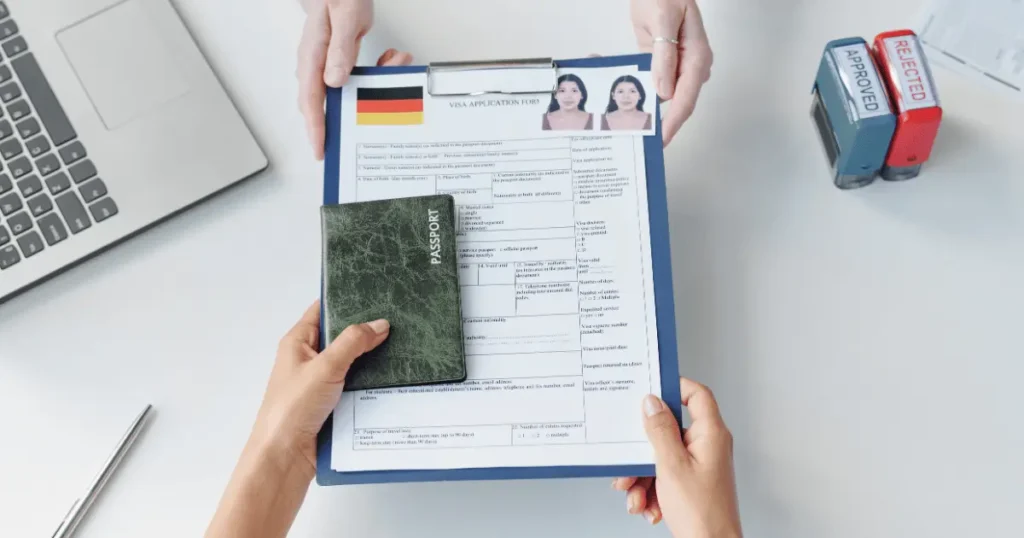- 1 Introduction
- 2 What is the IELTS Exam?
- 3 Specific IELTS Band Scores
- 4 Common Band Score Requirements for Study and Work
- 5 IELTS Score Requirements for Undergraduate Studies
- 6 IELTS Score Requirements for Postgraduate Studies
- 7 University Variances in IELTS Score Requirements
- 8 Types of Student Visas and Their Specific Requirements
- 9 Section-Wise IELTS Score for Germany Study and Work Visa
- 10 Advantages of Obtaining High IELTS Scores for Study, Work, and Migration
- 11 IELTS Test Duration and Scoring
- 12 IELTS Score Validity and Retakes
- 13 How to Prepare for the IELTS Exam
- 14 Exam Fees and Registration Process
- 15 IELTS Score Requirements for Obtaining Work Visas and Employment in Germany
- 16 IELTS for Migration to Germany
- 17 Study in Germany Without IELTS
- 18 How to Study in Germany Without IELTS
- 19 How to Apply for a Student Visa in Three Steps
- 20 Important Tips and Common Drawbacks
- 21 Scholarship Programs to Study in Germany Without IELTS
- 22 Typical Difficulties Faced While Preparing for IELTS
- 23 Tips for Each Test Section
- 24 Alternatives to IELTS
- 25 Frequently Asked Questions:
- 25.1 What is the minimum IELTS score required for studying in Germany?
- 25.2 Do different universities in Germany have varying IELTS requirements?
- 25.3 Is IELTS necessary for work visas in Germany?
- 25.4 Can I apply to German universities without an IELTS score?
- 25.5 What is the IELTS score needed for undergraduate programs in Germany?
- 25.6 Are there any specific bands required for each IELTS module?
- 25.7 Is a higher IELTS score beneficial for university admissions in Germany?
- 25.8 What if I achieve below the required IELTS score?
- 25.9 How long is an IELTS score valid for university applications in Germany?
- 25.10 What should I do if I want to study in German-taught programs?
- 26 Conclusion:
Introduction
Germany is a popular place for international students, workers, and migrants. To move to germany, a good IELTS score is required. This article will help you understand the IELTS score requirements for studying, working, and migrating to Germany.
What is the IELTS Exam?

Understanding the IELTS Exam Format and Its Components
- Listening Section
- Contains four recorded texts, including conversations and monologues.
- Candidates answer questions based on the recordings.
- Ensures the ability to understand spoken English in various contexts.
- Reading Section
- Consists of three passages with a variety of question types.
- Evaluates reading comprehension skills.
- Focuses on identifying main ideas, understanding details, and inferring meaning.
- Writing Section
- Includes two tasks:
- Task 1: write a description of the shown information(e.g., charts or graphs).
- Task 2: Write an essay related to the given topic.
- Shows the capability to express thoughts clearly and coherently.
- Includes two tasks:
- Speaking Section
- The valuations are conducted via in-person interviews with an examiner.
- It consists of three parts:
- Introduction and interview.
- Long turn where candidates speak on a given topic.
- Two-way discussion.
- Insures spoken English skills, including fluency, pronunciation, and grammatical accuracy.
Differences Between General Training and Academic Modules
| Feature | Academic Module | General Training Module |
|---|---|---|
| Purpose | Higher education admission | Work or migration |
| Reading and Writing Tasks | Academic-focused | Everyday English |
| Listening and Speaking | Same for both modules | Same for both modules |
Modes of Examination
- Online vs. Paper-Based Tests
- Online: Convenient and faster results.
- Paper-based: Traditional format.
- Scheduling and Test Day Procedures
- Regular test dates throughout the year.
- Arrive early and bring valid ID.
Specific IELTS Band Scores

Understanding the Importance and Implications of Different Band Scores
| Band Score | Description | Significance |
|---|---|---|
| 0 | Did not attempt the test | No proof of English language ability. |
| 1 | Non-user | no ability to use the language. |
| 2 | Intermittent user | Great difficulty in understanding English. |
| 3 | Extremely limited user | Understands only general meaning in very normal situations. |
| 4 | Limited user | Basic capability in normal situations. Regular breakdowns in communication. |
| 5 | Modest user | Partial control of the language, with inaccuracies. |
| 6 | Competent user | Normally effective control, despite some errors. |
| 7 | Good user | Working command, with rare inaccuracies. |
| 8 | Very good user | Fully operational, with only a few inaccuracies. |
| 9 | Expert user | Fully operational, fluent, with complete understanding. |
Common Band Score Requirements for Study and Work
Minimum Overall and Sectional Scores Required
- Study: The minimum overall score typically required is between 6.0 and 7.0.
- Work: Minimum overall score generally falls between 5.5 and 6.5.
- Generally: A minimum overall score of 6.0 is required, with no individual section score less than 5.5.
IELTS Score Requirements for Undergraduate Studies
Minimum Overall and Sectional Scores Required
- Generally, a minimum overall score of 6.0
- No less than 5.5 in each section
Examples of Universities and Their Score Requirements
| University | IELTS Score Requirement | Details |
|---|---|---|
| University of Munich | Overall: 6.5 | No less than 6.0 in each section. Required for undergraduate programs. |
| Technical University of Berlin | Overall: 6.0 | No less than 5.5 in each section. Applicable for both undergraduate and postgraduate programs. |
| University of Frankfurt | Overall: 6.0 | Minimum requirement for postgraduate programs. |
| University of Düsseldorf | Overall: 6.0 | Minimum score for undergraduate programs. |
| University of Marburg | Overall: 5.5 – 6.5 | Accepts a range of scores for postgraduate courses, with no section below 5.5. |
IELTS Score Requirements for Postgraduate Studies
Minimum Overall and Sectional Scores Required
- Generally, a minimum overall score of 6.5
- No less than 6.0 in each section
Examples of Universities and Their Score Requirements
| University | IELTS Score Requirement (Undergraduate) | IELTS Score Requirement (Postgraduate) | Details |
|---|---|---|---|
| Heidelberg University | Overall: 7.0 | Overall: 7.0 | No less than 6.5 in each section for both undergraduate and postgraduate programs. |
| Humboldt University of Berlin | Overall: 6.5 | Overall: 6.5 | No less than 6.0 in each section. |
| University of Munich | Overall: 6.5 | Overall: 6.5 | No less than 6.0 in each section for both undergraduate and postgraduate courses. |
| Technical University of Munich | Overall: 6.5 | Overall: 6.5 | No less than 6.0 in each section. |
University Variances in IELTS Score Requirements
Examples of Universities with Different Score Requirements
- University of Freiburg: An overall IELTS score of 6.0 is required for admission to most programs.
- RWTH Aachen University: Minimum overall IELTS score of 6.5 for undergraduate programs, with no individual section score below 5.5. For postgraduate courses, the requirement ranges from 6.0 to 6.5.
- University of Munich: An overall IELTS score of 6.5 is required for undergraduate programs, with no individual score below 6.0. The same requirement applies to postgraduate courses.
Importance of Checking Specific University Requirements
It is important for international students to carefully research and check the specific IELTS score requirements of the universities and programs they are interested in. Some universities may also have additional English language proficiency requirements.
Types of Student Visas and Their Specific Requirements

| Visa Type | Duration | English Proficiency Requirement |
|---|---|---|
| Language Course Visa | 3 months – 1 year | Proof of English proficiency (e.g., IELTS score) |
| Student Applicant Visa | 3 – 9 months | Conditional admission letter |
| Student Visa | 3 months – 1 year | Minimum IELTS score of 6.0 or higher |
Section-Wise IELTS Score for Germany Study and Work Visa
Sectional Scores Required for Study Visas
- Listening: Minimum 5.5
- Reading: Minimum 5.5
- Writing: Minimum 5.5
- Speaking: Minimum 5.5
Sectional Scores Required for Work Visas
- Listening: Minimum 5.0
- Reading: Minimum 5.0
- Writing: Minimum 5.0
- Speaking: Minimum 5.0
Advantages of Obtaining High IELTS Scores for Study, Work, and Migration
Better Chances of Admission and Visa Approval
- High IELTS scores significantly enhance the likelihood of securing admission to top German universities.
- A strong IELTS score can also facilitate the visa application process.
Improved Job Prospects and Career Opportunities
- High IELTS scores are often recognized by employers as a testament to a candidate’s English language skills.
- Many employers in Germany seek candidates with proven English proficiency, making a high IELTS score a valuable asset in the job market.
Scholarships and Financial Aid
- Many universities in Germany offer scholarships and financial aid to international students, often based on academic performance, including IELTS scores.
Eligibility Criteria
- No strict age limit, but the exam is generally suitable for individuals aged 16 and above.
- Open to candidates from all educational backgrounds, including those who have completed secondary education or higher.
IELTS Test Duration and Scoring

Test Sections and Time Allocation
| Section | Duration |
|---|---|
| Listening | 30 minutes |
| Reading | 60 minutes |
| Writing | 60 minutes |
| Speaking | 11-14 minutes |
Scoring Methodology and Band Descriptors
- IELTS scores range from 0 to 9, with each section scored individually.
- The overall score is calculated by averaging the scores from each section.
What to Expect on the Test Day
- Candidates should arrive at the test center at least 30 minutes before the scheduled start time.
- A valid form of identification, such as a passport or national ID card, is required for check-in.
IELTS Score Validity and Retakes
Duration of Score Validity
- Valid for two years from the test date.
Policies for Retaking the IELTS Exam
- No limit on retakes.
- Must wait for 3 months between attempts.
How to Prepare for the IELTS Exam
Study Materials and Practice Tests
- Official IELTS practice tests: These provide an authentic representation of the actual exam.
- Online resources and books: A wide range of preparation materials, including practice questions and tips.
Enrolling in IELTS Preparation Courses
- Many language schools and test preparation centers offer IELTS preparation courses that provide structured guidance.
Exam Fees and Registration Process
| Step | Details |
|---|---|
| Create an account | On the official IELTS website. |
| Upload required documents | Such as a valid passport or national ID. |
| Generally around USD 250. | According to schedule availability. |
| Pay the exam fee | Generally around $250 USD. |
IELTS Score Requirements for Obtaining Work Visas and Employment in Germany

Minimum Score Requirements for Different Job Sectors
Healthcare
- Minimum IELTS score: 7.0
Examples of Companies and Their Language Requirements
- Siemens: Requires a minimum IELTS score of 6.5 for engineering roles.
- Bayer: Often looks for candidates with an IELTS score of 7.0 for positions in healthcare and pharmaceuticals.
- SAP: Requires an overall IELTS score of 6.5 for IT roles.
IELTS for Migration to Germany
Minimum Scores for Migration Visas
- Generally, a minimum overall IELTS score of 6.0 is required.
Differences in Requirements for Various Migration Categories
- Different migration categories, such as skilled workers, family reunification, and students changing to work, may have varying IELTS score requirements.
Summary of IELTS Requirements for Work and Migration
| Category | Minimum IELTS Score | Details |
|---|---|---|
| Healthcare | 7.0 | Required for effective communication in clinical surroundings. |
| Engineering | 6.5 | Necessary for understanding technical documentation. |
| Information Technology | 6.5 | Important for collaboration and communication in IT. |
| Education | 7.0 | Required for teaching positions. |
| Hospitality | 6.0 – 6.5 | Changes by role, higher scores are preferred for management. |
| Finance and Business | 6.5 | Needed for effective communication in business backgrounds. |
| Migration | 6.0 | General requirement for migration categories. |
Study in Germany Without IELTS

Find The Alternatives to IELTS for Studying in Germany
Conditions Under Which IELTS May Not Be Required
- If the medium of instruction in previous education was English, students may be exempt from submitting IELTS scores.
- Some universities accept other English proficiency tests, providing flexibility for applicants.
Alternatives To IETTS
- TOEFL: Commonly accepted by German universities as proof of English language proficiency.
- Cambridge English Exams: Exams like Cambridge English: Advanced (CAE) and Cambridge English: Proficiency (CPE), are also accepted.
- PTE Academic: This test is generally accepted by universities in Germany.
Universities and Programs That Waive IELTS Requirements
Top Universities to Study in Germany Without IELTS
- University of Siegen: Offers various programs that do not require IELTS for admission.
- University of Kaiserslautern: Accepts students with proof of English medium instruction or other proficiency tests.
Specific Programs Available Without IELTS
- Some Master’s programs in Engineering and Sciences at these universities may not require IELTS scores if other conditions are met.
How to Study in Germany Without IELTS
Alternative English Proficiency Proofs
- Obtain a Medium of Instruction Certificate (MOI) from previous educational institutions, confirming that the medium of instruction was English.
- Check specific university requirements, as some may have additional criteria.
How to Get a Visa to Study in Germany Without IELTS?
Required Documents
- Proof of previous English-taught education, such as the MOI certificate.
- Admission letter from the university.
Visa Interview Preparation
- Be prepared to discuss your educational background and reasons for studying in Germany during the visa interview.
How to Apply for a Student Visa in Three Steps
- Apply to a German University
Ensure you meet the admission requirements and have all necessary documents ready. - Gather Necessary Documents
Collect documents such as the MOI certificate, admission letter, and proof of financial means. - Submit Visa Application and Attend the Interview
Complete the visa application form and attend the interview at the German consulate or embassy.
Important Tips and Common Drawbacks
- Start Early: Begin the application process well in advance to avoid last-minute problems.
- Double-Check Requirements: Confirm that all documents meet the specific requirements of the university and visa application.
- Practice for the Interview: Prepare for likely questions regarding your study plans and inspirations.
Scholarship Programs to Study in Germany Without IELTS
Available Scholarships
- DAAD Scholarships: Offered by the German Academic Exchange Service for international students.
- Erasmus+: Provides funding for students studying in Europe.
Eligibility Criteria and Application Process
- Check the specific eligibility criteria for each scholarship and follow the application guidelines carefully.
Typical Difficulties Faced While Preparing for IELTS

Difficulty in Listening
Many candidates struggle with the listening section due to the variety of accents and the speed of speech. To overcome this challenge:
- Practice with various English accents through podcasts, news, and films.
Writing Task Time Management
The writing section requires candidates to complete two tasks within a limited timeframe. Common issues include mismanagement of time and difficulty in organizing thoughts. To address this:
- Regularly practice timed writing and use overviews for the community.
Improving Scores in Weaker Areas
Candidates may find certain sections, such as reading or speaking, more challenging. To improve in these areas:
- Focus on targeted practice and pursue feedback from teachers or coequals.
Summary of Strategies to Overcome Challenges
| Challenge | Strategy |
|---|---|
| Difficulty in Listening | Practice with various English accents through podcasts and films. |
| Writing Task Time Management | Regularly practice timed writing and use strategies for organization. |
| Improving Weaker Areas | Focus on targeted practice and seek feedback from teachers/peers. |
Tips for Each Test Section

Practical Tips for Excelling in Each Part of the IELTS Exam
Listening
- Practice with different English accents.
- Focus on keywords.
Reading
- Skim the text first.
- Answer questions as you read.
Writing
- Plan your essay before writing.
- Practice different types of essays.
Speaking
- Practice speaking English daily.
- Record and review your speaking.
Alternatives to IELTS
While the IELTS exam is widely accepted by German universities and employers as proof of English proficiency, other English language tests can also be used to demonstrate language skills. These alternatives include TOEFL, Cambridge English exams, and PTE Academic.
TOEFL (Test of English as a Foreign Language)
- Internet-based test (iBT) that checks all four language skills: reading, listening, speaking, and writing.
Cambridge English Exams
- Advanced (CAE) and Proficiency (CPE) exams are two of the most identified Cambridge English tests.
PTE Academic (Pearson Test of English Academic)
- Computer-based tests that check reading, listening, speaking, and writing skills.
Comparison with IELTS
| Test | Comparison |
|---|---|
| TOEFL | – Similar format to IELTS with sections for reading, listening, speaking, and writing. |
| Cambridge English Exams | – Provides a more detailed examination of language abilities compared to IELTS. |
| PTE Academic | – Offers flexible scheduling with test dates available throughout the year. Scores are available quickly, suitable for last-minute applications. |
Frequently Asked Questions:
Do different universities in Germany have varying IELTS requirements?
Yes, requirements can differ; some universities may accept scores as low as 5.5, while others may require 7.0.
Is IELTS necessary for work visas in Germany?
No, IELTS is not required for work visas; language proficiency depends on the specific job requirements.
Can I apply to German universities without an IELTS score?
Yes, some universities accept alternative tests like TOEFL or may waive the requirement based on previous education in English.
What is the IELTS score needed for undergraduate programs in Germany?
Generally, a minimum score of 6.0 is required for undergraduate programs at public universities.
Are there any specific bands required for each IELTS module?
Some universities require a minimum band of 5.5 or 6.0 in each module; check specific university requirements.
Is a higher IELTS score beneficial for university admissions in Germany?
Yes, a higher score can enhance your application and increase your chances of acceptance into competitive programs.
What if I achieve below the required IELTS score?
You may need to retake the test or consider universities with lower score requirements or alternative language assessments.
How long is an IELTS score valid for university applications in Germany?
IELTS scores are typically valid for two years; ensure your score is within this period when applying.
What should I do if I want to study in German-taught programs?
For German-taught programs, you’ll need to demonstrate proficiency in German through tests like TestDaF or DSH instead of IELTS.
Conclusion:
It is important to achieve a strong IELTS score for studying, working, and migrating to Germany. It not only enhances your application but also improves your chances of success in these goals. Early preparation is crucial to confirm you meet the required scores. To simplify your application process, focus on thorough preparation, practice regularly, and use available resources. By staying dedicated and visionary, you can enhance your prospects and achieve your goals in Germany.
